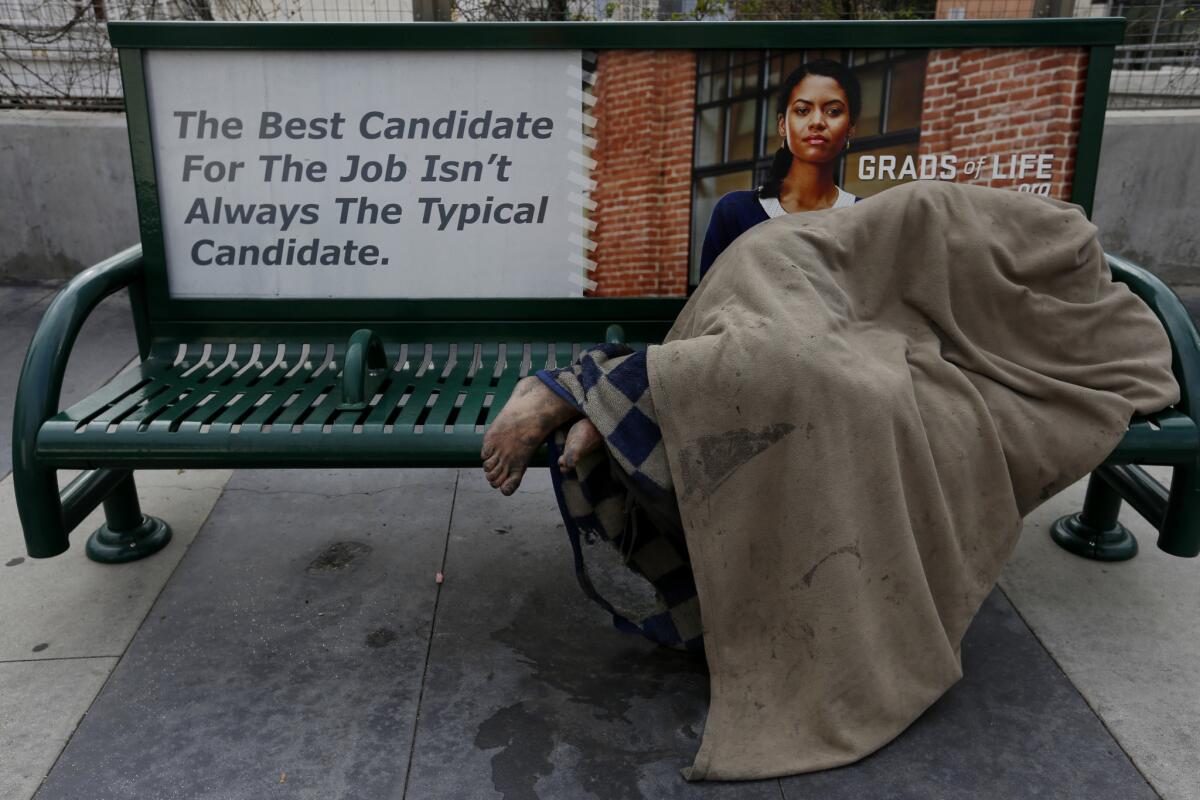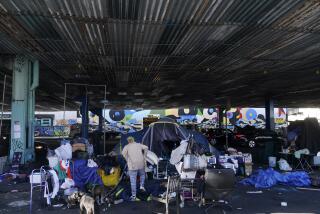L.A. spends $100 million a year on homelessness, city report finds

Los Angeles spends more than $100 million a year coping with homelessness, including as much as $87 million that goes to arrests, skid row patrols and mental health interventions, according to a report released Thursday.
City librarians, recreation and parks, sanitation and paramedics also devote significant resources to handling homeless people, without clear guidelines or a coordinated approach to guide them, City Administrative Officer Miguel A. Santana said in the 21-page report.
He said to his knowledge it was the first time the city had sought to gauge the full financial effects of its homelessness problem.
Many departments rely on emergency response teams from the Los Angeles Homeless Services Authority, a city-county agency, to respond to community complaints. But the teams, drawn from just 19 people covering the entire county and supported by $330,000 in city general fund money, are ill-equipped to respond adequately, the report said.
“There appears to be no consistent process across city departments for dealing with the homeless or with homeless encampments,” the report said.
It was commissioned by the City Council’s housing committee, which questioned why the homeless population, now 23,000, grew 9% between 2011 and 2013 even as the city contributed millions to the homeless authority. The results of the homeless count that took place in January are expected to be revealed this month.
“We’re spending more than $100 million to manage the problem,” Santana said in a phone interview. “How can we better align the money to address the outcomes we want to achieve?”
People involved in the homeless issue said they were dismayed but not surprised by the high dollar amount. Mark Ryavec, president of Venice Stakeholders Assn., expressed outrage that the city, long called the nation’s homeless capital, took so long to tally the costs.
“It should have been done many years ago,” said Ryavec, whose group has sued to force the city to declare homeless encampments in its community a public nuisance. “Under [former Mayor Antonio] Villaraigosa the city has been completely AWOL on treating the homeless, and I can’t say Eric [Garcetti] has done much more.”
Retired UCLA law professor Gary Blasi, who has studied homelessness extensively, said he welcomed the report and hoped it would begin shifting the city from managing to ending homelessness.
“It’s thoughtful and a positive step to look at resources the city already is spending that produces very little,” Blasi said. “People need to understand it is more humane and cost-effective to help people become not homeless.”
The report said it was not possible “to get a full measure of the costs” of homelessness for the city, or to monitor the effects of changes in homelessness over time in L.A.
Santana recommended that the city consider using consultants to track and monitor homeless numbers and efforts to reduce them. He also called for the city to create a homelessness office, set up neighborhood hubs to help homeless people in their communities, and spend more on homeless outreach and case management.
Councilman Gil Cedillo said he believed the mayor and council would support Santana’s proposals, but added that Los Angeles County, which controls mental health and social service funding, also needed to step up.
Garcetti spokesman Jeff Millman said the mayor was in New York accepting an honor and could not be reached.
“Most of the things in the report we are already doing,” Millman said.
Garcetti, in his State of the City address this week, called for $10 million to go to the city’s housing trust fund, half of which is to come from Airbnb taxes that are still to be negotiated.
Becky Dennison of Los Angeles Community Action Network, a skid row-based advocacy group, faulted the report for not urging the city to provide more housing.
Mollie Lowery of Housing Works, a Hollywood-based homeless housing organization, said it was taking her group six to eight months to find housing for homeless people, even those with subsidized rent vouchers and guarantees of services in hand.
“We already know what the need is, and we’re not matching it with housing,” Lowery said. “Now we’re just finding new ways to track them.”
Santana agreed that city housing must be expanded, but said assessing the scope of the homelessness problem was an important first step.
“It’s easy to point fingers at government,” he said. “Nobody wants formerly homeless people living next to them. But most people are not born on skid row; they come from somewhere. This involves all of us.”
Twitter: @geholland
More to Read
Start your day right
Sign up for Essential California for news, features and recommendations from the L.A. Times and beyond in your inbox six days a week.
You may occasionally receive promotional content from the Los Angeles Times.







